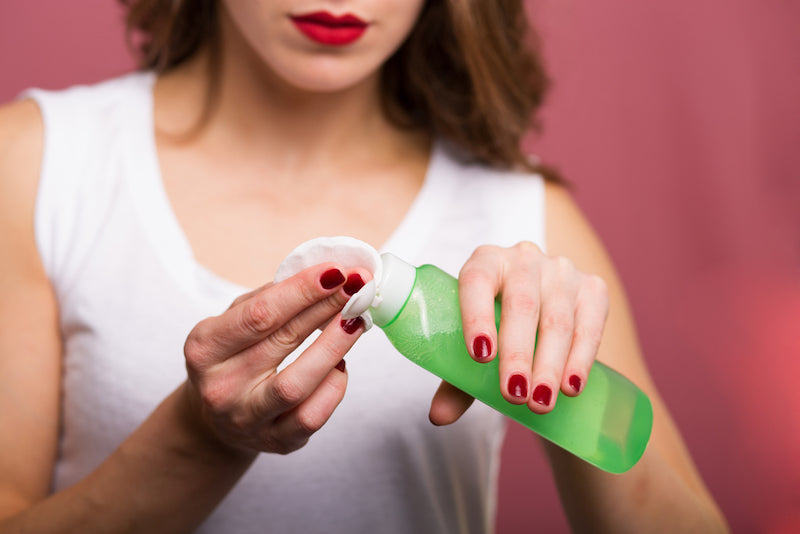
How Using the Wrong Facial Toner Can Lead to Side-Effects
Natural facial toners are integral to a skincare routine, helping with oil control, hydration, and even keeping your pores clean. But what exactly does a toner do? Toners are water-based products that prep the skin after cleansing, used before applying moisturizers or serums. The primary goal is to open up pores for maximum absorption of hydrating products, as well as to calm and hydrate your complexion while gently wiping leftover grime and residue.
Premium-grade toners are designed to be gentle on the skin, steering clear of any undesirable side effects such as burning sensations, excessive dryness, or eventual acne. On the contrary, toners formulated with low-quality ingredients pose a risk of causing avoidable adverse skin reactions. To assist you in distinguishing between toners that are truly beneficial and those that may pose potential harm, we have compiled a set of formula criteria. Following these toner guidelines will enable you to make informed choices, ensuring your investment in skincare is both effective and free from any harmful side effects for your face!
Common, Avoidable Side-Effects of Poor-Quality Toner
Side effects from toners are both common and avoidable. If you experience any of the below reactions on your face, don’t panic; rinse your skin with water and throw out your current toner in favor of a natural alternative:
- Burning/stinging sensation
- Excessive redness
- Dryness and/or flakiness
- Emergence of acne
- General irritation
What Makes Certain Toners Subpar and Cause Side-Effects
Inclusion of alcohol
Alcohol—a main ingredient in many toners—should be avoided at all costs, as its the primary source of related facial side effects. Firstly, it can contribute to acne. Alcohol can overly strip your skin of natural oils, throwing off the pH balance and resulting in an overproduction of sebum because your skin is trying to rebalance.
Another side effect of alcohol-based toners is often irritation and inflammation (aka, a burning feeling), especially for sensitive skin. Keep an eye out for the ingredients “denat” or “isopropyl” as these are hidden forms of alcohol.
Benzoyl peroxide
Benzoyl peroxide, a common ingredient in mainstream acne toners, serves as an effective antiseptic. It works by clearing clogged pores, reducing surface bacteria, and combating inflammation associated with breakouts. But its not without its downsides.
Although benzoyl peroxide is a common acne-fighter, it has many side effects due to its harsh nature. This intense toner ingredient can leave you with dry, peeling, flaky skin.
Synthetic scents or softeners
Synthetic fragrances are among the leading cause of irritation and other side-effects in over-the-counter toners and beauty products. The term “synthetic fragrance” is an umbrella term that includes thousands of different chemicals, all of which are harmful to the skin.
Triggering numerous allergic reactions such as rashes, headaches, and respiratory irritation, the most important thing you need to know about synthetic fragrances is to avoid them in all products, not just your toners.
Similarly, synthetic softeners, or conditioners, are just as harmful as synthetic fragrances. The ingredients in these softeners are chemically designed to lock moisture into the skin, containing many potential carcinogens like parabens, phthalates, and even petroleum.
How to Identify a High-Quality Toner
Plant-based, organically grown ingredients
Plant-based toner is a must for a clean, effective skincare routine. Using organically grown plant-based ingredients ensures that what you put on your skin is free of harsh chemicals, harmful toxins, and synthetic additives.
A toner enriched with a natural recipe gets it superpower from vitamins and antioxidants hand-picked for their ability to combat aging, improve skin texture, and promote a healthy glow. Plant-based skincare products offer dual benefits by being advantageous for your skin and environmentally friendly, as they are crafted from renewable and biodegradable resources, unlike synthetic ingredients.
High-quality toner ingredients
Opting for plant-based toners featuring premium ingredients is a reliable way to balance and refresh the skin without exposing it to potential adverse side effects. When perusing the ingredient list, prioritize natural options such as witch hazel, hyaluronic acid, neem leaf extract, and niacinamide.
Hyaluronic acid - helps regulate oil production and tones skin, leaving a smooth, refined surface. Intensely moisturizing, hyaluronic acid is a powerful anti-aging ingredient used to soften lines and wrinkles, making it an ideal ingredient in facial toners.
Witch hazel - this natural astringent gently cleans the skin without stripping away moisture. Ideal for irritated or inflamed skin, toners with witch hazel help give your skin a renewed, balanced look while clearing away pore-clogging dirt.
Niacinamide - more commonly known as vitamin B3, niacinamide promotes skin elasticity and minimizes pores' appearance. This vitamin also improves the skin’s barrier, helping to maintain moisture and keep your skin vibrant.
Neem leaf extract - this plant extract is packed with antiseptic and antibacterial properties that reduce acne and provide healing qualities. It also contains antioxidants, improving skin hydration and appearance.
Botanika Life crafted our Calm It Down Facial Toner harmonizing these and other all-natural ingredients, including CBD and floral extracts, resulting in a well-balanced toner that is both gentle and effective.
Other Reasons Your Toner May Cause Side-Effects For Your Face
While the ingredients in a facial toner is the primary culprit for related side-effects, its not the only consideration. Other factors include:
- You may be applying too much toner to your face. Always follow instructions on the packaging and avoid applying it more than twice a day.
- You may be using an astringent rather than a toner. The two types of products, astringents and toners, share similarities but are not entirely interchangeable. Generally, astringents tend to be more potent and may result in more pronounced facial side effects compared to toners.
- You may be using the toner in conjunction with other products that irritate skin. A gentle toner by itself should not cause facial side-effects but, if used alongside other products that serve similar purrposes (and have similar ingredients), the combination of the two could prove particularly harsh for your skin.
- You may have particularly sensative skin. Certain conditions, such as rosacea, can increase the susceptibility to experiencing side effects from facial toners.
FAQ About Facial Toner Side-Effects
Can toners cause acne and pimples?
Certain toners can cause acne and pimples, especially if they contain harsh ingredients like alcohol, which can irritate and dry out the skin. This irritation can lead to increased oil production and clogged pores. It's important to choose a toner suited for your skin type and avoid ingredients that may trigger breakouts.
Should I use toner every day?
Yes, using toner daily helps maintain clear and balanced skin. It removes residual impurities, tightens pores, and preps your skin for better absorption of moisturizers and serums. When using a high-quality toner, you can safely use it both morning and night without fear of side-effects.
Is toner good for teenage and younger skin?
Teenagers are successfully use toner, especially if trying to keep skin clean to help prevent breakouts. However, it's important that they use well-balanced formulas that are suitable for sensative complexions in order to minimize the risk of toner-caused side-effects.

By Emily Wegener
With a unique background as an Integrative Nutrition Health Coach, Masters Degree in Teaching and experience in Psychology, Emily spends much of her time researching and trying out new holistic healing modalities.


